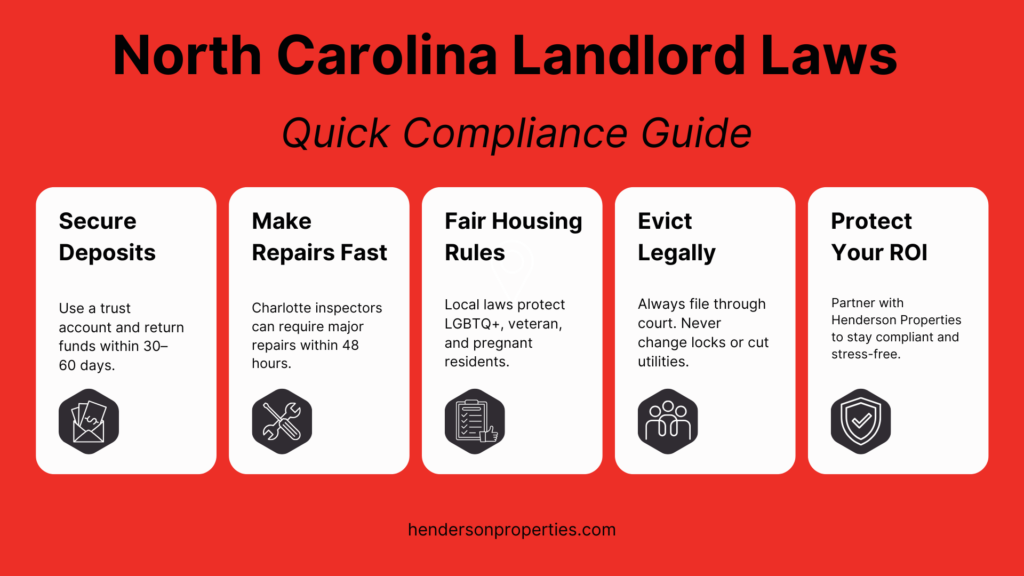- Walk-in Traffic is by Appointment Only - More Details
North Carolina Landlord Compliance Checklist (2026 Edition)

Charlotte Real Estate Outlook: Q4 2025 and Q1 2026
September 29, 2025
Charlotte Is the Southeast’s Land Investment Hotspot
October 5, 2025Charlotte Landlord FAQ
Aside from local concerns about the Panthers finishing with a winning season, where the next brewery is going in, or traffic on Providence, landlords around the Queen City have lots to think about.
This 2026 edition of the North Carolina Landlord Compliance Checklist breaks down the top laws every landlord and investor should know, neatly summarized for easy digestion…
Security Deposits
In North Carolina, landlords cannot just keep a security deposit in their personal account. State regulations require deposits to be placed in a trust account at a licensed bank or savings institution, or secured by a bond for that amount.
After the lease ends, landlords must return the deposit within 30 days or provide an itemized deduction list. If repairs are still being estimated, landlords can send a partial accounting and complete it within 60 days. Not adhering to these deadlines could result in losing the right to withhold any funds.
Within 30 days of move-in, you must notify residents where their deposit is held.
There are also strict limits on how much you can collect:
- Two weeks’ rent for week-to-week leases
- One and a half months’ rent for month-to-month leases
- Two months’ rent for longer-term leases
Notice Periods and Lease Changes
North Carolina is considered a landlord-friendly state, but that doesn’t mean “no rules.” For month-to-month leases, you need to provide at least seven days’ notice before ending the tenancy or changing major terms such as rent. For yearly leases, the notice period is one month.
The law doesn’t require notice before entering a rental unit, but “reasonable notice” of at least 24 hours is standard practice and strongly recommended. Respecting privacy isn’t just courteous; it reduces friction and builds resident trust.
And while rent control is prohibited statewide, it’s smart business to give ample notice (30 days or more) before increasing rent, especially in competitive markets like Charlotte’s South End or NoDa neighborhoods.
Maintenance Is Non-Negotiable
Landlords must keep all rental units safe, sanitary, and fit for habitation. That includes maintaining plumbing, electrical, heating, and structural systems, as well as handling repairs promptly once notified.
North Carolina’s “implied warranty of habitability” means you’re legally obligated to provide functional heat, water, and electricity. You must also install and maintain working smoke detectors and carbon monoxide alarms.
In Charlotte, city housing inspectors are proactive. A tenant complaint can trigger an inspection, and serious violations, such as broken heating in winter or electrical hazards, must be fixed within days, not weeks. Maintaining a strong vendor network and scheduling seasonal tune-ups helps prevent these emergency costs.
Fair Housing
Federal law prohibits discrimination based on race, color, religion, sex, national origin, familial status, and disability. But Charlotte and Mecklenburg County extend protections even further.
Locally, you also cannot discriminate based on sexual orientation, gender identity or expression, pregnancy, veteran status, or hairstyle. These categories are now part of the city’s Human Relations Ordinance.
In practice, this means reviewing your advertising, application process, and screening criteria for neutrality. Avoid language that could discourage families, LGBTQ+ residents, or veterans. Apply the same standards to every applicant and document your decisions.
Also note: while North Carolina law allows landlords to decline applicants with rental assistance (vouchers), if you participate in city or county subsidy programs, you must accept voucher tenants as part of those agreements.
Lease Agreements and Required Disclosures
Although verbal leases may be legal, written leases are the gold standard for investors. Every agreement should clearly identify the landlord or management company, the bank holding the deposit, the rent amount, and any late fees or addenda.
North Carolina caps late fees at $15 or 5% of the monthly rent, whichever is higher. You can only charge after rent is five days late, and only if this is clearly stated in the lease.
Other required disclosures include:
- Lead-based paint (for homes built before 1978)
- Known mold or environmental hazards
- Meth contamination, if applicable
- Flood risk, if the property is in a flood zone or has a history of flooding
The Eviction Process
North Carolina’s eviction process, known as summary ejectment, is designed to be fast and straightforward when done correctly. But skipping steps can be costly.
You must provide a written 10-day demand for payment before filing for nonpayment of rent. If the tenant still hasn’t paid after that period, you can file an eviction claim in small claims court. After the hearing, if the resident doesn’t appeal within 10 days, you can request a writ of possession authorizing the sheriff to remove the tenant.
Never attempt a “self-help” eviction by changing locks or shutting off utilities, as this is illegal and can result in damages or legal penalties. As of late 2024, willful damage over $1,000 is a felony, providing landlords with more protection against malicious damage.
Charlotte-Specific Considerations
Charlotte enforces its own minimum housing standards under the city code, which closely mirrors state law but with added oversight. Landlords who fail to respond to resident complaints may be cited by the city’s Code Enforcement division, often with tight deadlines for repairs.
While there’s no general rental registration system in Charlotte, landlords should ensure their properties maintain valid certificates of occupancy and comply with any HOA rules or zoning restrictions.
Charlotte’s court docket is busy, and eviction filings can take longer to schedule than in smaller counties. Working with a local property management firm familiar with Mecklenburg’s court system can save time and protect your interests.
Why Compliance Equals Profitability
For investors, a well-managed, legally compliant property keeps residents longer, minimizes turnover, and maintains asset value. Each noncompliance issue avoided is time and money saved.
Henderson Properties helps landlords across Charlotte and Mecklenburg County stay compliant with changing laws, manage maintenance efficiently, and maximize cash flow.
Contact Henderson Properties for a personalized property management proposal and see how our compliance-first approach helps investors achieve steady, long-term returns.








